Text
I found your perspective on the notions of power in which this anime tackles was very nuanced, especially the connections you make to Japan's history and how you tackle the gender roles that have come with that established society. In particular the discussion of power dynamics and how the government handles that said power are powerful concepts that are tackled by this show, in particular with Squealer and his evolving colony of queerats, even at the expense of the Queen Queerat as you had previously stated. The historical pull of Queen Himiko was one I would never have even thought of and it frames this work in a much more fascinating context, with this eugenics based society drawing from real feudal Japanese societies in more ways than just visual.
Shin Sekai Yori (15, 21, 24, 25)
In episode 15, we can see Squealer and his species worry about becoming extinct and therefore try to exploit the queen. They knew they were smart and believed that they deserve some power, yet the queen had so much and ruled over them unfavorably. I feel like this represents governments/powers throughout history: the government exploits or neglects its citizens and, therefore, the citizens retaliate, protest, etc. at the power's expense. The citizens come together to build power and make changes to the government/power. Squealer and his species worked together, forming a union, and tried to negotiate, yet they ended up trapping her and still exploit her for the benefit of the colony. This is similar to when the newly formed government reduces the power of the leader, making them instead a public figure (kind of like the president or prime minister). Then we see things like war prisoners, enslavement, imperialism/colonialism in episode 21, which we see in history during an overthrow of rule as well. In the last episode, the Squealer talks about how change is necessary, which I do think is true, but that the sacrifices would have been worth it if they had won, which I disagree with: in the end, people lost their lives. War and violence are the problem (I can see why Squealer thought they needed to resort to it, especially when they tried to propose equal rights, but to continually hurt the Queen and other species? That does not seem very moral). In the end, it is quite a morally grey area when you consider all things, though.
I think there is also commentary on patriarchy. The Robber Fly colony thinks that the queen's only job should be childbirth, while the "smart" ones should have the power. The queens are stuck inside (domestic duties, trapped in the house) while the men (I think) are free to roam and rule. This also reminds me of Japanese history. There were queens with power an extremely long time ago in Japan, like Queen Himiko, that people at first accepted as ruler; however, men soon believed they deserved the power, labeling women that ruled as evil (people believed that Queen Himiko had magical powers that she used for evil purposes as well), resulting in men ruling Japan. Then, they use violence, blaming the Goat Moths for shooting an arrow when they used violence first. This represents the common opinion that men often resort to violence more compared to women, like starting something as small as fights or as big as war.
Now, something that I find quite disturbing is how kids ended up having a child?! Like I think they are 14? Definitely an interesting plot by the storywriter - I wonder what the idea was behind that?
I think that overall, this anime is a commentary on power, whether its a ruler, and man and woman, magical powers, or the responsibility that comes with it.
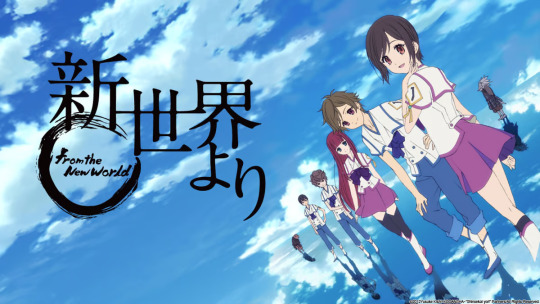
8 notes
·
View notes
Text
I'm glad you also recognized the similarities to A Promised Neverland as a lot of the anime in this class, including this one, are works I haven't seen or even heard of so drawing connections between more mainstream works help further establish a show's identity in my mind. Since I can't speak Japanese, it's always interesting to hear how this unique take on a Japanese society also has dialect eccentricities with it that further distinguish it as a wholly unique world, one that happens to match the almost medieval/feudal look of Japanese society. Your emotionally charged analysis of the anime's discussion with eugenics was particularly potent and made it easily digestible because I felt the exact same way saying how these children were being culled all for slightly stepping out of line emotionally. I feel like your analysis of the broader themes and events associated with the show were intriguing. Great post!
Shin Sekai Yori (1,2,4,12) 4/16/24
Right off the bat I am really intrigued by the dramatic premodern look of this anime. Furthermore, listening to this in Japanese is interesting as I can hear the honorifics and polite language used. Furthermore, the religious aspect is quite interesting.
Okay so after watching the first episode I feel like this is almost similar to The Promised Neverland in a way. Like there is very obviously something going on behind the scenes with these children that is concerning. It seems to me that they get weeded out and murdered based on their ability to control certain powers.
Wow :) starting off the 2nd episode with a 100 person sacrifice!! Seems like the children are pitted against each other perhaps in a way that sorts them from least most valuable. So we see that people who misbehave disappear. Also there is this connection to the female character Maria- who just so happens to have a non-Japanese first name-and the deaths of some group of people or maybe children...
Ahhh so now things are making sense. They are absolutely being screened for their personality traits. Even though some other guy claims what was being said was lies, I don't believe it. This is extremely creepy and I have concern for these children now that they know what I believe to be the truth. There is no reason for this guy to steal their powers if he didn't have something to hide. The whole imagery of this show is weird, the pink tones, the dark settings, the premodern temples and characters.
Skipping ahead so bunch a things will get confusing... So an older Saki is being considered for a leadership position due to her very stable personality. I think this reveals that everything said in episode 4 is true. Okay so it seems that people with uncontrollable rage and emotions may morph into demons or ogres. Even innocent sweet people are capable of having power leaks that can harm others. WHAT A SAD WORLD THEY LIVE IN. ONE PERSON MUST BE ISOLATED WITH THESE TERRIBLE MEMORIES IN ORDER TO PROTECT OTHERS FROM DEMONS. BUT ALSO THEY MUST SCREEN AND KILL CHILDREN AS WELL.
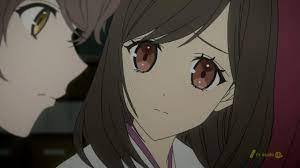
1 note
·
View note
Text
Finally, I find another person that compares this movie to Perfect Blue despite them initially not having anything in common with each other, and I'm glad we share the same opinions on the nature of the work's confusion but also its visual theme of reflection and mirroring. Your analysis was great, especially your points about Freudian psychology, an aspect I wouldn't have thought of but makes so much sense when discussing a work as dream-centered as Paprika. I also felt lost throughout a majority of its run time but thankfully kind of pieced things together as the film was wrapping up but believe me, I shared your sentiments of having no idea what the hell was going on. Despite your stated confusion, I thought you did a great job in summarizing and analyzing this extremely complex work and I'm glad we share the same takes with Perfect Blue. Great post!
4/22 Paprika
Oh boy and I though Perfect Blue was confusing...
I do wanna applaud the director for doing a great job blurring the point between dream and reality to the extent he did because a whole driving plot point is being in other people's dreams BUT maybe I just lack the aptitude for deeper psychological themes because I was so incredibly lost.
With Perfect Blue you do get the same sort of dazed questioning what's going on feeling but it's not so jarring to where you struggle to understand like I felt this movie was.
If you subscribe to the Freudian ideology where dreams are repressed wishes that reveal more about a person, the idea of a device being developed that allows you to see someone else's dreams as a way of helping them could be groundbreaking however as was shown in this I feel the kind of invasiveness of this could only lead to bigger consequences in the future.
I didn't really like the way Dr. Chiba was fat shaming Tokita and also wasn't a huge fan of how she kept blaming him for EVERYTHING. Furthermore, I found the scene where Paprika is like ripped open to reveal Dr. Chiba on the inside- was really oddly sexual and uncomfy. In a lot of the odd dream sequences there were dolls or other child-like items so having these random groping scenes or someone getting shot repeatedly was a weird juxtaposition. As for like deeper analyzable themes I'm struggling a bit on that so I'm looking forward to hearing others thoughts in class.
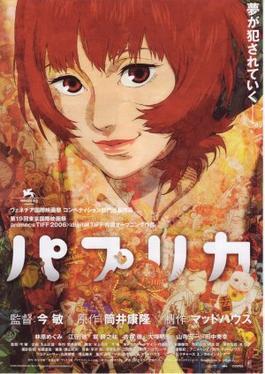
4 notes
·
View notes
Text
For starters, I loved your real world connections that you established with the events of the show like Akira's utilization of the NEETs and comparing it to a youtuber using an exorbitant amount of money to a cause only for it to backfire on them like Mr. Beast and his aiding of blind people. Your discussion of the themes of misinformation due to the internet is a well-founded one that is tackled, especially with the discussion of those in power being morally corrupting and manipulating the truth for their own agenda like the Selecao do. Like Serial Experiments Lain, I'm glad you pointed out the prophetic nature of this show in how it characterizies trends of social media that are relevant today despite not being as relevant when the anime was released. How NEETs are effectively ostracized and cast aside just like how many feel as social media has interconnected an isolated more and more people. I felt that you had a nuanced take on these episodes and I think your real world connections have fostered a stronger enjoyment from this show out of me.
Eden of the east pt 2
I legitimately have lost track of the plot. It feels like it comes in one ear and out the other but I’ll try to form some coherent thoughts about it. A plot point I thought was interesting was how the male lead tried to give the neets purpose by having them help evacuate people from the missiles. A seemingly nice deed gets contorted into being something far more sinister by others when in reality it really was just a nice thing that was done. I’ve seen similar things occur online where a YouTuber might donate an exorbitant amount of money to a cause, cure blindness, and feed the needy, but there will still be people who believe they are evil. In the case of this anime, it shows how easily people come to conclusions without proper evidence, another common behavior on the internet. Despite the anime being over 10 years old, made in a time when social media had yet to take over communication styles like it has today, its interesting it was able to portray behaviors that have only gotten worse since then. In the case of the neets, it shows how easy society is to reject others. Considering how this was probably the first time these people contributed to society being met with hostility, it definitely demonstrates how tainted people have become. Rather than a love thy neighbor mentality, or people feeling united by shared characteristics or beliefs, it seems like everyone is disconnected. There’s a lack of unity that has led to people viewing people outside of their group as an “other” or a “them” within an us vs. them mentality. Overall I like how this show highlights several issues people face within society, but dislike how the plot creates more questions than it answers.
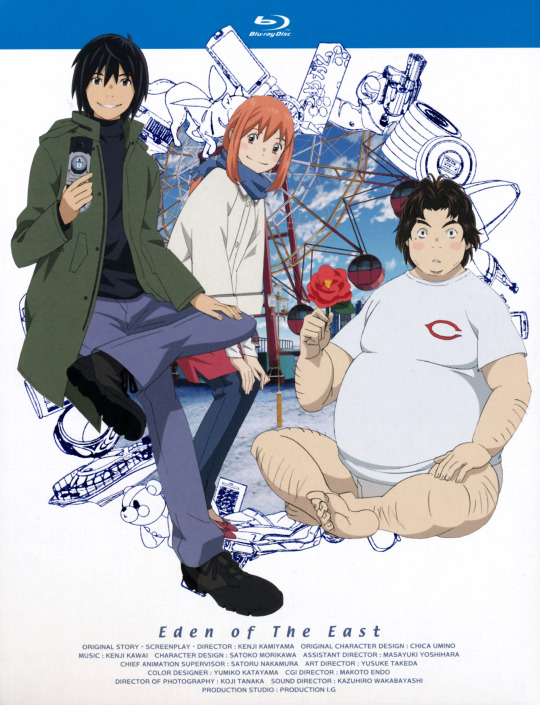
2 notes
·
View notes
Text
I also have been slacking on my blog posts so, felt. Other than that, I understand the feelings of your post, as someone who's watched the entire show, many of the questions and sentiments you possess about this show are well founded and don't really get explored throughout its entire runtime. It has accompanying movies to further delve into the world but I have to agree that many of your annoyances with the exposition in this show are ones I share. However the way the show develops the mystery of the NEETs and Akira are compelling because of how absurd of a character he is. This is the opening portion of the show so a lack of context is expected but your analysis and criticisms are sentiments that I share. Also, one last note, I HAVE NO IDEA WHAT THAT SCENE WAS ABOUT AND IT DOESNT GET EXPLAINED!!! I'm just glad I wasn't the only one extremely confused by it lmao
4/12
Yikes, I've been slacking on my blog posts!
Eden of the East was a very interesting watch... it reminded me a lot of Mirai Nikki! The opening monologue gave me flashbacks to Penguindrum though.
I'm really enjoying Akira's character, though its frustrating to be learning about him at the same time he does. I find it very dissatisfying to be given exposition in this way. From the first few episodes, I also feel frustrated that I don't know enough about Saki. I want to know what she threw toward the White House, and why is she looking for a prince? I feel like she has some relationship to the game they are playing, but at the moment, I'm not sure what it is.
The anime/manga we look at in this class often have a very clear message, but this one I'm not so sure. Maybe we missed some exposition from episode 2, but why was Tokyo attacked with a missile? I feel like it wasn't talked about enough in the episodes we watched and thus left me pretty confused. However, I did sometimes feel that this anime was like a sarcastic version of the weird conservative manga we read recently. Some of the dialogue made it seem like the director/producer was sarcastically being like: "I love that our country is useless right now and we leave the protecting of our people to other countries!" The whole anime was really strange and confusing, but I did enjoy watching it. I like sly characters like Akira, so watching him get away with things is really fun.
I like Saki so far, but I still just don't know enough about her. Honestly I'm just confused about everything right now, I hope we'll get answers to our questions both tomorrow and in the next set of episodes.
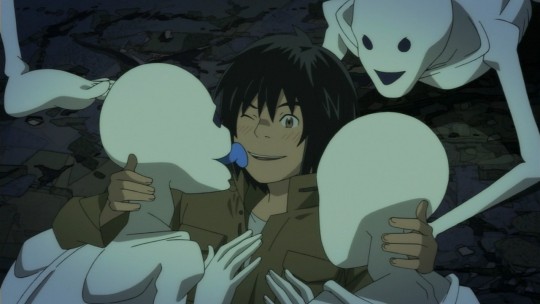
Also, what the heck was this? ^^^
3 notes
·
View notes
Text
To start, I love the way you formatted this post as it's been a while since I've last watched Zipang and your episodic analysis gave me a great reminder of context. Alongside that, you provide a great summation while tackling the themes of the show, like the prevalent one of the Mirai crew almost playing God with how they could change the outcome of the war with their superior technology and standing. Moral quandaries like that are what make the show interesting and I'm glad you were also enraptured by the show's development of those themes. The contrast with a humbled yet still honorable Japan was a notion that I found particularly intriguing for a wild card like Kusaka to explore, as it truly is a man trying to have his cake and eat it too, with an utter refusal to pick a poison to develop Japan. I found your post to be filled with nuanced commentary in a very digestible and coherent manner that made it very enjoyable to read. Great post!
Zipang (13,17,21,25) 4/10/24
13: Woowwww. I knew something big was coming. So basically now that the people on board the Mirai are aware of what they are capable of, and because they have not been able to find their way forward in time, they start getting ideas on what they should do. It seems to me that the more nationalist character, Kusaka, is ready to take things into his own hands to curate a new future for Japan. (Things are getting more big picture) I mean I do kind of understand this. He wants Japan to be humbled yet maintain some dignity. However, these types of decisions and ideas do not come without stipulations. It's like they're almost playing God in this situation, they have the knowledge and power..
17: In this episode we see a lot of exchange between the soldiers from the Mirai and also the soldiers from the time period they are in. While this episode carries less weight to me than the last I think it's important because it addresses individuals responsible for so much death and essentially is a sense of relief to the viewer as there could be some conflict resolution here. What I am saying is, as someone watching this in the 21st century, I think it could be almost theraputic.
21: I think this episode represents the integrity of the characters well. They are bound by their situation as it is basically impossible to get back to the future at this point or even if it is, it would not be the future they know. Yet, they do not want to cause American deaths, yet rather would like to prevent Japanese deaths by showing their strength. Their hand is forced here which shows that they are people of integrity put into a terrible situation.
25: Finally we see two somewhat opposing Japanese ideologies clashing. There is the concept of "Zipang" or rebuilding Japan with dignity yet also maintaining militarism or the concept of allowing Japan to crumble for the sake of the future. Pick your poison.
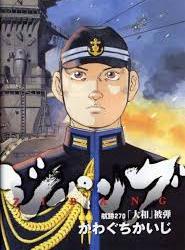
1 note
·
View note
Text
The Back to the Future reference is always appreciated and I greatly enjoyed the moral dilemmas introduced with the time travel of Mirai. Your analysis of Yosuke and Kusaka in how their personalities only further contrast them and by extension their generational divide between the SDF and Imperialist Japan. Along with that, your take on the commentary of how the SDF is seen as weak is straight from the author's perspective as well, as the mangaka of Zipang frequently criticized the SDF and how their role is inherently too passive and that an ideal Japan would take both halves of compassion and military tact to form a military that can protect and prevent wars from happening altogether. Overall, I found your analysis of the first batch of episodes compelling and I feel you've made me appreciate Zipang a bit more.
Blog 32- 4/8
I think the premise of Zipang is pretty cool, exploring history through time travel and grappling with the cultural differences between two eras of the same place. Besides the Back to the Future-esque plot in which by existing at the wrong time and performing actions have profound impacts on the known future, I think that this use is a creative and interesting commentary on Imperial Japan and modern Japan. We see that despite being from the same country, Takumi and Yosuke are worlds apart, defined by the lens of warfare. This separation is evident through both character’s personalities; Takumi is stoic, reserved yet confident when he speaks, and is not shy to engage in warfare, even when the enemy is his country, while fighting on behalf of his country. On the other hand, Yosuke is humble, more expressive and sensitive to the well-being of all parties, which could be shaped through the fact Yosuke has never even engaged in war up until the time swap. This kind of commentary can be viewed in two ways, one being a negative statement towards the modern zeitgeist of Japan and its lack of focus on military strength or mental fortitude, while the second focus (which is probably more of the commentary the studio was going for) seems to showcase the importance of WW2, and how Japan’s loss was a blessing in disguise. While Japan’s defeat shattered its previously unwavering identity of imperial dominance and dedication to the throne, it gave way to a new identity, one that is void from the tragedy of war and promotes the liberties of its citizens. I think that it’s interesting that Takumi has had the opportunity to glimpse into the future and doesn’t like the Japan Yosuke lives in, and this in some ways may reflect the value of the those who have lived through WW2 into the modern era, due to the fact it is such a different identity than the ones they were raised with, and was not the projected future pre-WW2.
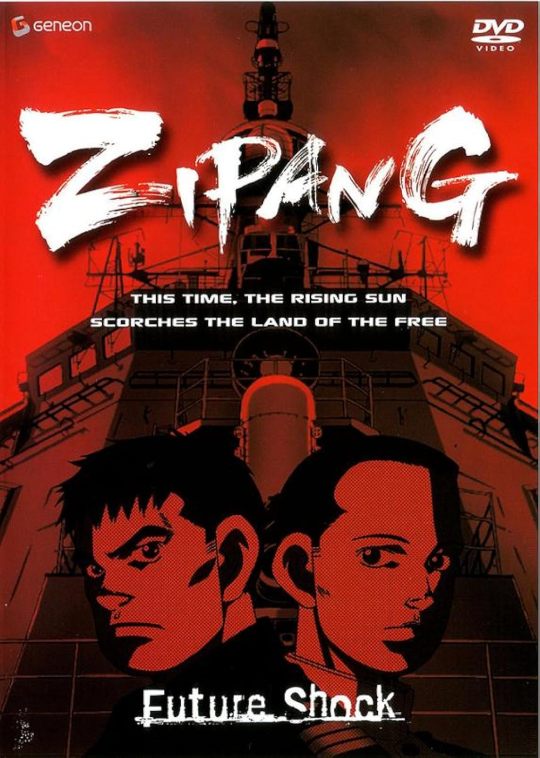
1 note
·
View note
Text
Your point on the line being blurred throughout the show was something I noticed as well, as the Wired is just serving as a more hyperactive and interactive form of the internet, with which the show's sound and visual design heightens to a degree I haven't seen with other shows in a long time. Your connection to the silencing of children through giving them tablets was a point I had not even thought of but now is so accurate in how technology is depicted in this show to effectively silence isolate characters, even when they still socialize like with Lain and her father. The COVID aspect was another point I realize is so intertwined with the themes of the show in how it warps socialization and I found that to be an incredibly compelling point. Overall, I thought you had a fascinating insight to the show and feel like the sporadic viewing of the episodes does not help gather details to understand the themes, so I feel like it'll be explored in class discussion.
4/24 Serial Experiments Lain (1,4,7,12)
This was definitely different from what I was expecting, especially with the opening episode showing the suicide of someone in connected to the main character.
Themes of blurring the line between humanity and technology are really common as a whole are decently common and often are some version of what these four episodes showed-this idea that the human body is inferior or weak and one must be enlightened of spared by giving it up in some way.
In regard to the whole blurring of the real world and the Wired it's kind of interesting to think about what reality truly is. Growing up in this tech savvy generation where 8 year olds have a nicer iPhone than I do, parents pacify children with tablets, and people hide behind screen names I think there's definitely a case to be made that people are more truly themselves on line. Be it because they feel freer that way or because they think they can get away with more, real in person interactions have definitely warped even in just the last 5 years or so (thanks COVID) but even then they were already changing before that.
Overall the art style of this anime felt very Sunday morning comic strip to me and beyond the blurring of reality I kinda struggled to understand the deeper themes of what was going on here. I also spent like the first 3 episodes trying to decide if Lain was a girl or a boy but maybe that was an intentional choice by the creators to make her more ambiguous. I'm hoping hearing so other people's opinions in class will give me some more clarity.
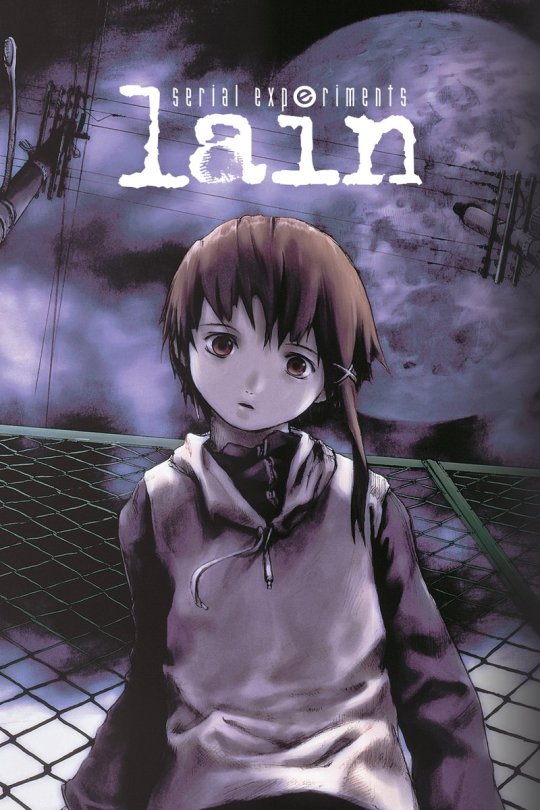
3 notes
·
View notes
Text
I found your analysis and way of wording the themes of an unorthodox show like Welcome to the NHK was very insightful and entertaining to read. A thing I had also recognized that I hadn't seen many others talk about was how the girl from high school having pills indicates the inherent struggle present with being involved in society, a sentiment that only further marks this show as sympathetic to NEETs and hikikomori. Our mc struggles internally with this battle of socializing and being a member of society is so well contrasted with the otaku next door who merely sees himself as superior to everyone despite being in the same position as our mc. In short, your analysis helped further reinforce this show in my mind as a compassionate depiction of hikikomori and NEETs, continually showing that they can improve and begin the journey of becoming a member of society again.
Welcome to the NHK
Although this anime depicts a lot of degeneracy, it can be so funny sometimes, so I actually found myself liking it. The display of hikikomori was interesting, and how the main character internally knows he is one, but still finds it hard to admit to others. That battle within himself was interesting to watch as it’s also him debating if he should actively start seeking help and regain control of his life. That aspect was both frustrating as well as relatable as its a common problem when realizing you have a problem. I also liked how the show depicted other characters' issues in a nonobvious way. For the girl whom the MC knows from high school, she just casually all the pills she has on her. Although I may have misunderstood it, I viewed it as a way to show that she’s also struggling to fit in with society. This is ironic considering she’s a civil servant and is seemingly living the ideal life of a Japanese adult, a stable job, and disposable income. Despite these things, the anime demonstrates how people like this can still struggle. Another interesting character was the otaku next door. Despite him not being a hikikomori, he’s definitely more of a degenerate than MC. While he was explaining his school life, I thought it was funny how he was unknowingly pointing out why he’s disliked by his classmates. Although he’s still part of society, he cannot understand how his own behavior affects other people's perceptions of him. He views himself as superior and can’t fathom others' ideas being better than his. Overall, I like how Welcome to the NHK demonstrates how there’s no one stereotype for those who struggle to fit in society. It shows how even those that seem put together can be struggling and sometimes it's our fault and we need to realize we do have control of our life.
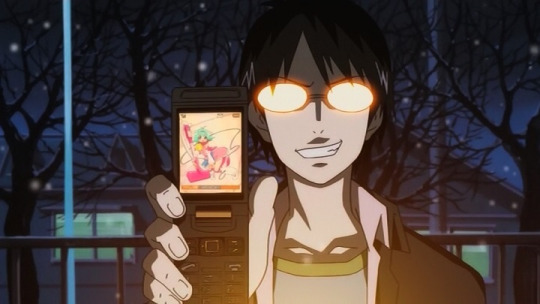
1 note
·
View note
Text
I know you were pumped for this show and that passion shows in this analysis, especially with how the show deconstructs American tropes in media like the mafia and how it explores gender roles. I recognized the commentary of the mafia, but somehow didn't recognize the bizarre perversion of it with "Papa" Golzine being the progenitor of sexual abuse and toxic masculinity incarnate, a sentiment that only deepens the commentary on how sexuality is depicted int his show. Like with Papa, many of the other homosexual characters in this show are characterized as freak rapists who just see men, especially Ash, as sex toys to be used, a horrific misshaping of the classical criminal organizations integral to American pop culture. This alongside with how the relationship between Ash and Eiji is a perfect contrast, as the horrific sexual abuse associated with the mafia only further highlights the gentle and compassionate relationship between our two main characters. Overall, I'm glad you sold me on the show and its one of the few shows in this class that I watched all the way through cause I enjoyed it to a significant degree.
4/1 BANANA FISH!!!
Banana Fish is one of the examples where a BL was done correctly. The portrayal of Ash and Eiji’s relationship is done so well; it is not exaggerated or overly sexual, but realistic of what a homosexual relationship could be, ignoring the gang/mafia violence aspect of it of course. Some may believe that their relationship is platonic and that they are friends, but it is clear that their relationship is deeper than just friends. Ash had to choose between saving Shorter or Eiji in episode 9. Despite Shorter being Ash’s closest friend and knowing Eiji for a few days, he chose to save Eiji. In a way killing Shorter was also like saving him, but I don’t think many would choose to kill Shorter in this situation if they were Ash. The approach to gender and sexuality expression is shown completely through male characters. Ash is a very beautiful person who is often described as having feminine features, however, his behavior is more masculine than how he appears. Eiji is a soft character inside and out; I will say he is strong because of how much he has been through, but he is still a very soft and emotional character. Which you often do not see expressed in male characters. Ash was taken by Golzine and abused by him and others for a very long time. Expressing his emotions (or enjoying life) is not something that Ash often has the privilege of. However, upon meeting Eiji, this side of him is able to come out. This anime is also the portrayal of American life within a mafia from the perspective of the Japanese. In other American films or shows of this genre, you often seen gangs that have this very strong sense of family. I think Banana Fish took this concept of family and presented it in the most perverted way. Golzine is like the father of this mafia (they call him Papa…) and he has raised (abused) characters like Ash, who he expects to respect and treat him like a father. I also think this anime expresses the idea that toxic masculinity can be seen in homosexual relationships. All the characters who are actually called gay are rapists and abusers, like Marvin. Overall this anime is one enjoyed by all, in my opinion. It is technically a shonen and appeals to a male audience, and despite it having very different aspects than your everyday BL, many BL enthusiasts also enjoy this show. Also one of my favorite anime intros of all time.

3 notes
·
View notes
Text
For starters, I'm glad this class got to show you Your Name as its one of the most beautifully crafted animation pieces of the past few years. I find your discussion of the themes of this work particularly interesting as it was not something I had realized, as many works like Onward to our Noble Deaths or Phoenix do wear their themes on their sleeves and show them at the forefront of the work. Meanwhile this is much more focused on the romance aspect, but also could be commentary on gender due to the body swapping but with a much more subtly discussion of traditionalist Japanese beliefs being paramount to survival. Also your pointing out of Taki's wristband was not something that I noticed until my second rewatch of the film so good eye in recognizing that subtly! In short, I greatly enjoyed your post and I'm glad you enjoyed the film.
Your Name 4/1
(Before I get into the meat and potatoes of this film, I'd like to say; RadWimps at it again with another banger music design, they really understand how to make the music of a film not only stand out, but also fit the atmosphere of its movie so well <3)
Your Name is an anime movie I had heard a lot about, but never actually took the time to see (up until now.) I thought it would be similar to movies like Penguin Highway or Lu Over the Wall; stylistically beautiful, impressive art direction, with a coming-of-age story. To some extent, I was correct, but the metaphors that referenced natural disasters was a refreshing new perspective, and I overall really enjoyed the film.
What's so interesting about this film is that it's hard to pinpoint an individual theme or point of the film, (at least in my opinion) which isn't really something I've had issues with thus far in this class, as most of the media we've discussed either wear its themes on its sleeves (it makes it clear what it's trying to comment on) or the theme is complex in the sense that it involves many different facets, however, this film takes its time to discuss many different themes of coming of age angst, rejection of previous generation rules, and gender normative social rules (which are always awesome to comment on)
I also appreciated the attention to detail the art direction had, such as Taki's wristband, which acted like a subtle reminder to the audience, as Taki only wore the wristband when he was himself, or when the background later has a missing tree after the outdoor cafe is completed, it makes the world feel so much more real! Not to mention how *stunning* this film is OMG there is not a word that can adequately describe how amazing this film looks.
//another side tangent, the scene when Mitsuha, while in Taki's body, struggled to find the right first person pronoun was SO FUNNY I struggle with that as well ALL THE TIME in my Japanese class LOL\\
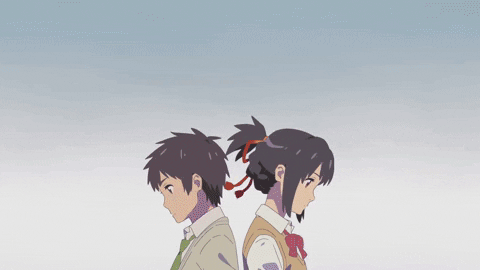
2 notes
·
View notes
Text
To begin, phenomenal analysis on Sensoron as I think it's one of the most unique works we've had to analyze throughout this semester with it being such a comedic lens to look at the atrocities of WWII. Your commentary on the character designs representing the Japanese and those in power are portrayed as fat and unsightly and conventionally attractive respectfully, a detail that contributes to the overall narrative of shifting blame and manipulating those who are not as respected at a glance. Your look at how to this work can apply to other examples of politics like the American alt-right, a connection that only further unsettles me in the conservative undertones that are so inherent to the subject that this work covers. In short, your connecting of the dots to other political realms only made the work more intriguing to delve into.
3/27/24 "Sensoron" and "Neo-Nationalism and the 'Liberal School of History'" JPT3391
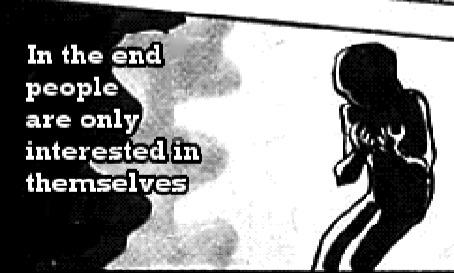
Phew! Today's was definitely a read! I had a very difficult time discerning this text from irony. It actually took Prof. Smith straight up telling me that this text was right-wing Japanese propaganda to realize! Up until then, I was too naiive to believe that was even a possibility of reading in class.
Effectively, this manga comments on the greater Japanese 'social issue' of the postwar peace movement. The creator of the manga likens China to.... a man taking too long shitting in the toilet? He argues that he is right to treat his employee like 'a roach', just like the Japanese were right to 'do what they did' during the war...
He then proceeds to raise the strawman: 'what about Japanese war crimes?! here are some 'edited' or 'mislabeled' photos to show what we did wasn't all that bad!'. He showcases images of the Rape of Nanking, as well as Bombing of Chongqing and argues that these images were either doctored or forged. While I agree that doctored and forged imagery are a plight upon the spread of truthful information, the author argues that because the images shown have evidence of forgery.... these heavily documented events of arson, rape, and murder were either orchestrated by an 'inside group' of Chinese civilians, or made up by American's in order to make the Japanese media feel 'war guilt' for their ancestor's crimes. Why? Because according to him, everything is anti-Japanese propaganda. China, Korea, and America hate Japan.... so the 3 use disinfo to subjugate the Japanese into peace.
This type of text is also applicable to the American alt right, and is something I see frequently. Many Jews in America are terrorized by the 'free thinkers' who claim the holocaust didn't exist, and much of the evidence (you can also claim this for 9/11) was misrepresented.
Furthermore, the manga is argues individualism is bad, because it's an American brainwashing technique. From previous discussions in class, I was already aware that Japan's 'highly-collectivist' society are their alt right's claim to fame. That being said, they claim that Japan's individualism doesn't exist, and any sight of it is just people brainwashed by American individualist propaganda.
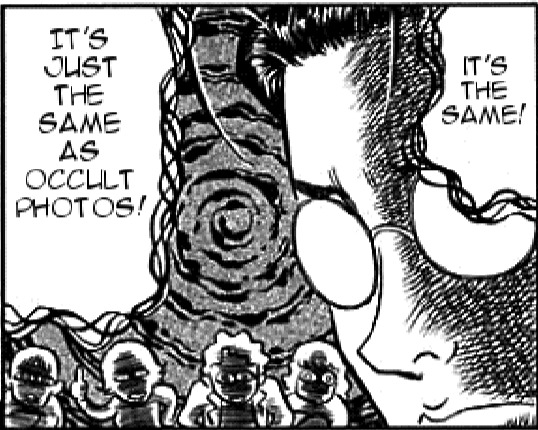
This manga capitalizes on people's fear and hunger for justice. it argues that half of the information (photos, texts) that people have been terrorized with since birth are FAKE!! That's a scary thing to hear! And instead of teaching those that it's important to learn about history to single out the facts from a set of information, the manga instead takes the reader's newfound fear and liken's their 'oppressors' to the occult, to evil, and makes the readers into victims. This is a very slippery slops I've seen people around me fall into. It turns fear into hyper-protective skepticism: "I think the LGBT is harming our youth! Time to wipe them out." "I think [insert minority] is biologically inferior and dangerous, time to wipe them out". etc. etc.
I added this smug loser in at the end because I found it funny how (in the manga) the brainwashed Japanese are portrayed as ugly, fat, etc., while the main character himself is drawn as an attractive, young man. Really makes you think!
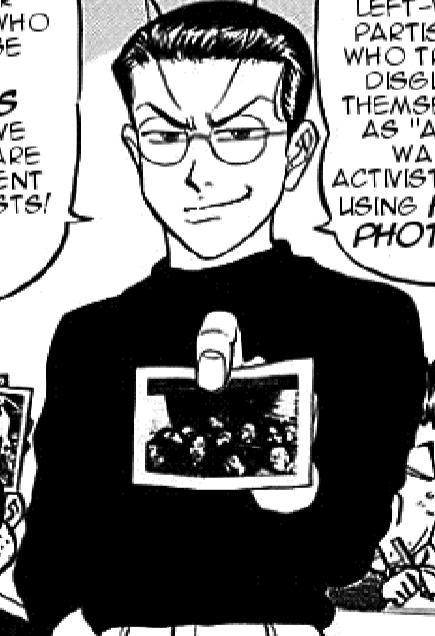
6 notes
·
View notes
Text
It's glad to see I wasn't the only one extremely confused about the list of episodes we had to watch, as this show already is confusing and the lack of context provided by the full show didn't help us. I also agree with the recurring red 95 circle visuals that would cover to indicate the arrival of the otherworldly figures as it gave a great visual context despite not being the most apparent meaning. That and the overarching visuals of trains and their alerts, and the constant ringing to indicate flashbacks show that this anime has great visual storytelling and I'm glad we can agree on that!
3/25
We're finally done with Penguindrum! Genuinely disappointed that this wasn't a silly penguin anime, but I digress.
We learn that Himari isn't actually blood related to the brothers, but honestly, I'm still not convinced that this anime wasn't made to appeal to incest fans (imagine being a fan). Maybe I'm just being too critical, but I genuinely feel like this was a plot point later added to "make up" for the incestual themes we saw previously. As others have mentioned, there is NO reason for there to be incest. I feel that there is no narrative reason for Kanba to be attracted to his YOUNGER SISTER. It's just so gross to me.
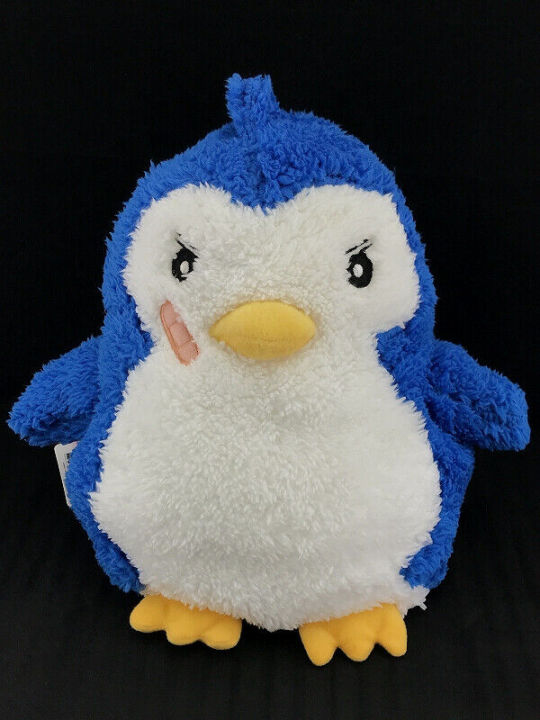
The ending of this show was honestly confusing, but that is to be expected since we've only seen 6 episodes. Himari died countless times and was brought back countless times, but now she's back for good while her brothers are gone (kind of). We were told that fate cannot be changed, but I guess it can? I have to wonder though, would Himari have wanted this to happen? Why did both of her brothers need to sacrifice themselves for her? I feel like their sacrifice was selfish, but maybe that's just me. I just don't find this ending to be satisfying. What is satisfying is that after tomorrow's class I'll never have to think about Penguindrum again.
Aside from the plot, I still feel that the imagery, symbolism, and all the visuals in general were really well done. I loved the scenes where the red 95 circle would cover the whole environment, I thought that was so cool and so eerie and offputting. I love that in media!
2 notes
·
View notes
Text
Hi Mason, to start off, I greatly enjoyed your post as you shared many of the same sentiments I had with Penguindrum. I imagine the sporadic viewing and inherent unorthodox style of the show contributed to the confusion but it was at least a uniquely drawn source of confusion. The entire plotline of Himari was tough to sympathize with due to the sheer amount of times she dies and the bizarre possession interactions between her and her brothers, which was a bit too charged with incest for me to find entertaining. It's at least balanced out with bizarrely entertaining dialogue, a fascinating take on the Serin gas terrorist attacks, and vibrant character designs that at least make it fun to look at while being confused.
Post for 3/22
I’ll be honest: Penguindrum was unlike any other anime that I’ve watched before and it was really confusing. I felt like the abstract storytelling was their intention but I just couldn’t quite follow along with the show’s messages. For me, it was just a bit too abstract to comprehend. In my opinion, it was harder to comprehend than The End of Evangelion (great movie, though). I do appreciate how committed the show is to its stylistic niche, though. Every flashback that happens is accompanied with a clear visual and auditory indication. There are repeated motifs such as when the camera follows the different colored lines until they end (which I assume represents the characters’ mortality). If I was a lore expert and did understand what was happening, then I’m sure that I would be a big fan. I’m sure there’s an abundance of hidden meanings that I totally missed. Maybe after we discuss the anime’s themes in class, it would grow on me.
Something that prevented me from feeling sympathy for Himari’s death(s) was the plot armor that she was given by the whimsical penguin lady that possessed her. In one moment, she’s suddenly dead, and in another, she’s back and completely healthy. It plays with Shoma and Kanba’s feelings because they are slightly confused every time it happens, too. Every miracle becomes something you end up expecting. Even when the penguin lady said that there wasn’t any hope left to save Himari, the pink-haired doctor just ended up saving her, anyway. Maybe the show is trying to satirize the concept of fate? Perhaps it is saying that fate isn’t as set in stone as the characters think. Again, I look forward to hearing other people’s interpretations of the show.
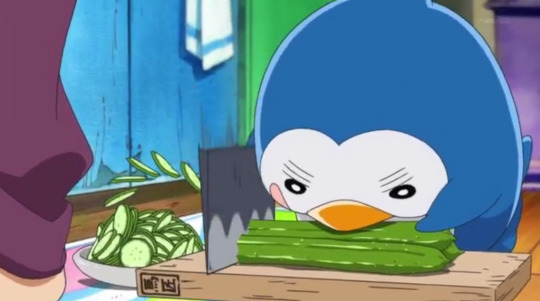
Image of one of the imaginary penguins from https://practicaldelusion.blogspot.com/2011/07/mawaru-penguindrum-01-penguins-do-make.html.
4 notes
·
View notes
Text
Serial Experiments Lain 4/24/24
And here we have the final post that I'm going to make for this class, and we're ending on a work that wasn't even made in the 20th century but is as contemporary as ever with the themes that it tackles. To start off, Serial Experiments Lain is unique in the sense that it has one of the most fleshed out sound designs I have seen in any anime. There's always a constant whirring in the background, creating a constant imbalance that has you begging for silence, however, when you achieve that silence you're met with scenes of intense discomfort and surreal eeriness. The sound design truly contributes to Lain's unraveling psychologically, with the utilization of characters speaking without sound and the amplification of commonplace sounds like chalk on a board, it all works in tandem to sustain the uneasy tone as we find more about the Wired and the many subsets of it. Speaking of which, for a show made in 1998, it has the most contemporary themes I've seen, with it perfectly capturing the wonder that is the internet, where despite having the entire world at your fingertips and connections everywhere, it can still isolate individuals and contribute to loneliness. Lain is a perfect main character to tackle this theme, with her introverted nature being a relatable trait that I myself can identify with, allowing me to understand her head first diving into the internet and how that obsessiveness can affect one's understanding of identity and reality. This series is just so naturally eerie, with the world being drenched in light and the almost-brutalist architecture further contributes to the anxiety this show induces in you. Even the way this anime handles social interactions are so grounded and based in reality, with discussion of tragedies like suicides being treated as less and less significant as the series progresses. In short, the questions that Serial Experiments Lain raises about technology and its relation to identity still remain relevant in modern day, with an almost prophetic understanding of how the internet and digital communication would reshape human lives through vessels like social media, virtual reality, and even more recently the discussion of artificial intelligence.
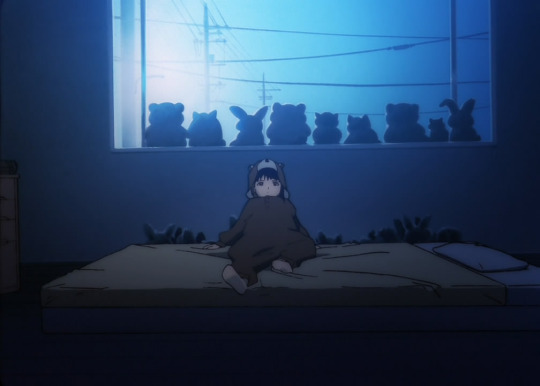
I feel like this image captures the tone of this show very well, Lain is a just a young girl who seems to be surrounded by this indescribable sense of emptiness and isolation despite having everything she could desire upon first glance. Her also putting this bear suit on is a visual representation of this lack of control and self, as she has a greater understanding of her place as a child in a world she doesn't understand.
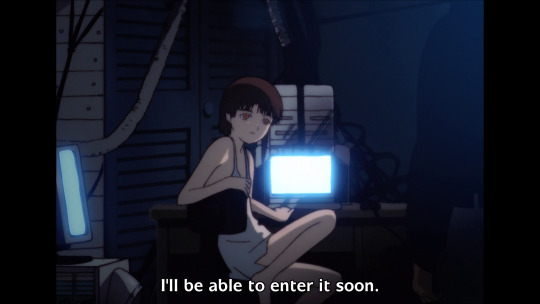
I found this conversation between Lain and her father to be a fascinating evolution from the previous one in ep 1. Lain has immediately become more engrossed in her Navi and is now serving as the technologically consumed reflection of her father, who now stands in her position almost confused as to what his daughter has grown into. I plan on rewatching the whole series for context but just from this few episode display, I can tell this show shall be one to remember.
4 notes
·
View notes
Text
Paprika 4/22/24
I had always heard about this movie, but had no frame of reference for it, but upon seeing the art style I immediately saw striking resemblances to Perfect Blue I assumed it was going to be visually gorgeous and absurd film, and boy was I correct. This film like the aforementioned Perfect Blue deals a lot with reflections, with all of the main cast having their own twisted reflection of themself that propels each of their character journeys. Whether it be Atsuko's reflection being the titular Paprika, Detective Konakawa and his deceased friend, or even Osani and Chairman Inui, reflection populates this film and is tied directly with the theme of identity and self-discovery that this entire movie is drenched in. Even the distinction between Atsuko and Paprika showcases the inherent disconnect between her sense of self, with Paprika being colorful, spunky, laid-back, and free as opposed to Atsuko's real life serious demeanor, constrained appearance, and flat color scheme. This is even representative with the dream world and reality, with the dream world usually being doused in a Spirited Away-esque parade that gives it an energy and vibrance that is absent from the more monotone, flat, and dark color scheme that reality has. This visual style is even reflected at the end of the field with Inui's nightmare delusion image corrupting the dream world with a darkness seen with reality, a void that is consuming the spirited world of dreams. Aside from this constant showcase of reflection, this movie was just gorgeously made, the animation captures the peculiar but open domain that dreams can often be, whether it be Konakawa's inability to run, the walking through solid surfaces, and how quickly things seem to go out of your control, it truly made me feel like I was watching dream sequences for its entire runtime. The visuals house a fascinating look into the ethics of technological advancement with the DC Mini device having the potential to effectively change how the mind is studied, but also cause an equal amount of damage that would change the landscape of mankind. These themes of personal privacy and autonomy are paramount in the overall message of this movie, with the DC MIni showcasing such beauty but putting so many at risk with its unlimited freedom and lack of control. To summarize, this film was insanity, and despite being confused for a majority of the runtime, I enjoyed it to a degree I wasn't expecting. I like to think of this movie as a sister movie to Perfect Blue as they have the contrasting colors of blue and red in the posters and in name, and the main character dealing with the same identity issues, and frankly I feel that enhances both of these movies.
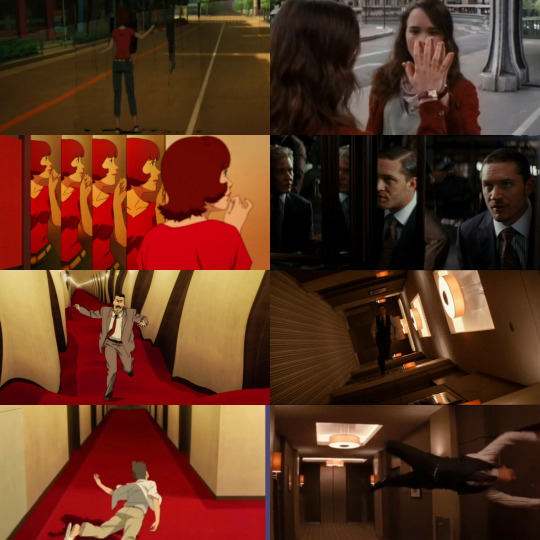
Even before I watched this film I knew of the visuals that inspired Inception which only enhances the film because these shots quite literally were copied and finding out that Christopher Nolan potentially took inspiration from this film was very intriguing. It's also interesting to note that the show similarities all embody common features of dreams, like the bizarre movement, reflections being so abnormal and the unorthodox cinematography that both films utilize.

This was pretty much my expression throughout this entire film, god it was just mesmerizing but for so long I was so lost as to what was happening lmao.
2 notes
·
View notes
Text
Late Post: Shin Sekai Yori Pt. 2
We've come to the conclusion of this tumultuous and telekinetically-charged discussion of eugenics and class division, what a ride it has been. For starters, the entire finale was a perfect conclusion to the entire "Shonen A" depiction that has been showcased throughout all fiends with the Messiah being an ultimate culmination of the unknowable aspects of children in the perspective of Satoru and especially through Saki. The Messiah being essentially a tool for Yakomaru's rebellion only further showcases the similarities between the PK humans and the queerats, as they both use the same telekinetic abilities to establish dominance on the other class, signifying that despite their outward differences they are one in the same as a society. Alongside this, we begin to see the inherent hypocrisy present in this version of Japan, with them perpetuating a eugenics based civilization but looking down on the queerats for committing morally questionable actions like the lobotomizing of the queerat Queen while they erase the children that don't meet their criteria. These episodes do phenomenal work in showcasing how each side is a reflection of their opposition with them possessing the same mentality and desires, but in the case of the queerats because they loss and are seen as inferior they are declared the evil faction. This entire final portion of the show is so drenched with ethical dilemmas and consequences, with the moral greyness being showcased in all of the characters, Squealer starting a revolt that leads to the death of many innocents, Saki potentially jeopardizing the world to save Satoru and essentially sacrificing Kiboumaru, and especially seen with Kiboumaru's reveal that his tribe was collecting nuclear armaments to effectively eliminate all opposing forces to his colony. This moral grayness contributes to the themes of sacrifice and redemption that each character goes through, being signified most clearly with how Saki and Satoru's child serves as the ultimate representation of the humans redeeming themself. In spite of all of the terror and fear that the PK children and "Shonen A" fiends represent, they are still the future and represent the next generation and the future that can improve. The anime even ends with the sounds of children laughing and Saki writing a letter while pregnant, being both visual representations of how despite the potential unknowing aspects of them, children are what change everything.
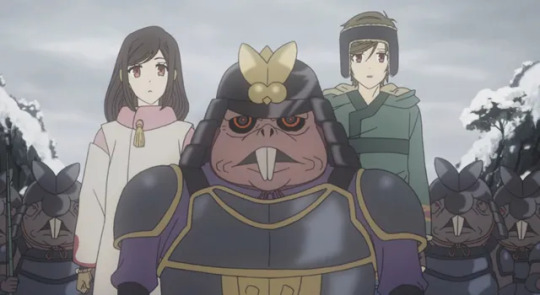
It's interesting to note that Squealer/Yakomaru sports a classic feudal samurai armor, given that he's meant to be the reflection of humanity. This draws up the parallel between his rebellion effort fueled by the same sense of pride and ego that fueled many of the lords of the era for which the armor comes from. It is meant to give him a noble appearance but this sequence only further showcases the dichotomy between his outward exterior of friendliness to Saki and Satoru and the inner lying will he'll go to to achieve his goals (i.e. destroying the Goat Moth colony stronghold).
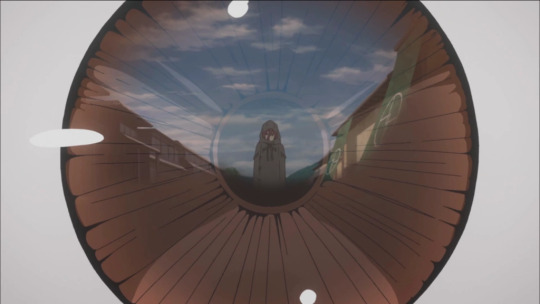
Aside from just being a really cool shot, it further illustrates the "Shonen A" visage that many of the fiends in this show possess, showcasing the sheer fear associated with these unknowable figures, especially in the case of Saki. This perception of children through this lens of horror is the very overarching theme that this society discusses how it can effect the development of children to begin with. Of course it's only further showcased with the ensuing rampage that the Queerat Messiah wreaks through the lens of Saki and Satoru.
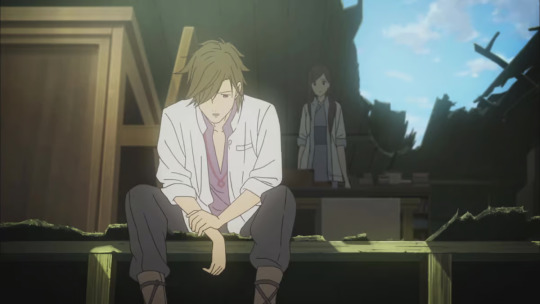
This is the scene that put everything into perspective, with Satoru revealing the queerats to be originally humans without PK abilities but in a state caused by genetic tampering. This is only made more impactful with this having the hindsight of Yakomaru's rebellion and trial, showcasing that he was justified in his quest and that they really were human. This scene serves to conclude and only further emphasize the class divide commentary that the show handled with the queerat plotline.
0 notes